Timeline: Pro-Morsi protests
- Published
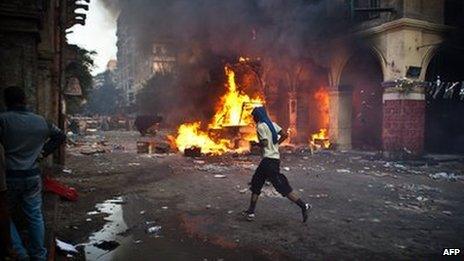
The area around Ramses Square in Cairo was the focus for protests on Friday
Once again the Egyptian capital Cairo is seeing bloody clashes between security forces and anti-government protesters.
This week's bloodshed is the culmination of weeks of tension at the sites of two sit-in protests mounted by the Muslim Brotherhood of ousted President Mohammed Morsi.
Mr Morsi was deposed by the army on 3 July after mass protests against him.
16 August
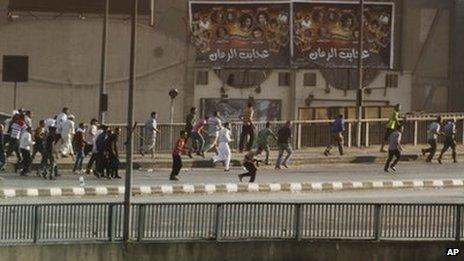
The Muslim Brotherhood calls for a "day of anger" following Friday prayers in response to the bloodshed two days earlier. The focal point for protests is Cairo's Ramses Square. The demonstrations quickly turn violent, with fierce street battles between Morsi supporters and plainclothes police and armed neighbourhood vigilantes who support the military government.
Many of the dead and injured are taken to al-Fath mosque, near Ramses Square, which becomes a makeshift field hospital. The Egyptian government says 173 people have died as a result of the day's events. Over 1,000 Muslim Brotherhood members are arrested, and weapons confiscated, according to the interior ministry.
14 August
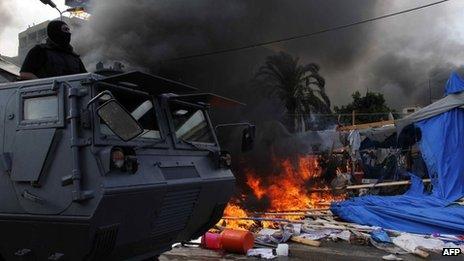
Security forces move in in the early morning on the two sit-in protests where Morsi supporters had been camped out for six weeks. Tear gas is used and gunfire is heard. Armoured bulldozers are used to dismantle the camps.
More than 600 people are killed in the operation, authorities say - the Muslim Brotherhood puts the death toll at more than 2,000. Clashes spread to other Egyptian cities, with reports of attacks on churches and against government buildings.
The presidency announces a month-long state of emergency. Vice-President Mohamed ElBaradei announces his resignation from the interim government.
11 August
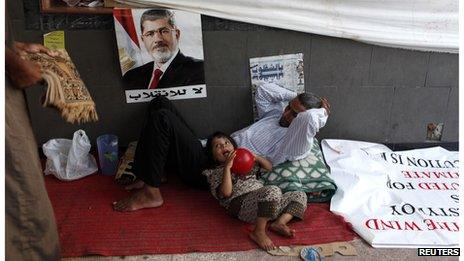
Security forces threaten to clear sit-ins. A security official tells BBC Arabic the authorities had hoped the announcement to disperse them would encourage protesters to leave. However, the number of people at the sites increases and the operation is postponed.
27 July
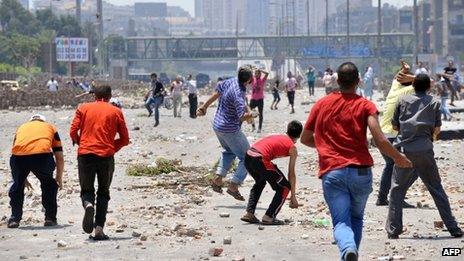
More bloody clashes between security forces and pro-Morsi protesters at the Rabaa al-Adawiya sit-in. Doctors estimate that more than 100 people were killed, but the health ministry puts the death toll at 65. Mr Morsi's Muslim Brotherhood blames the military for the deaths, accusing soldiers of shooting to kill. The government has denied this, insisting security forces only used tear gas, not live rounds. But a BBC correspondent in Cairo says the government claim appears to be untrue, given the severity and number of injuries. The Egyptian interior minister warns protesters they will "soon" be dispersed from Rabaa.
8 July
At least 51 people die in clashes between pro-Morsi protesters and security forces near the Presidential Guard, where his supporters suspected he was being held. The Muslim Brotherhood said the army raided its sit-in at about 04:00 (02:00 GMT) as protesters were praying, and said that children were among the victims.
4 July
Pro-Morsi protesters gather at the Rabaa al-Adawiya mosque in the eastern suburb of Medinat Nasr and Nahda Square near Cairo University to the the west. Mr Morsi and several other high-profile Muslim Brotherhood leaders are arrested.
3 July
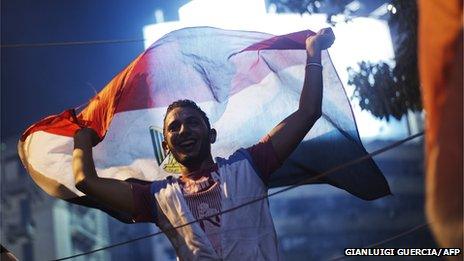
President Mohammed Morsi is deposed by Egypt's military after mass protests against him. The military suspends the constitution. A coalition of Islamist parties calls for mass demonstrations to denounce the army's actions.